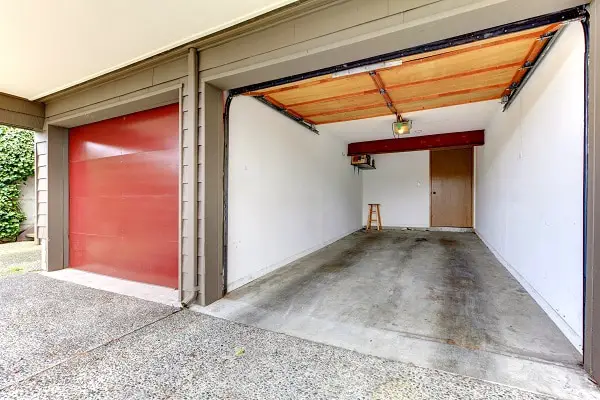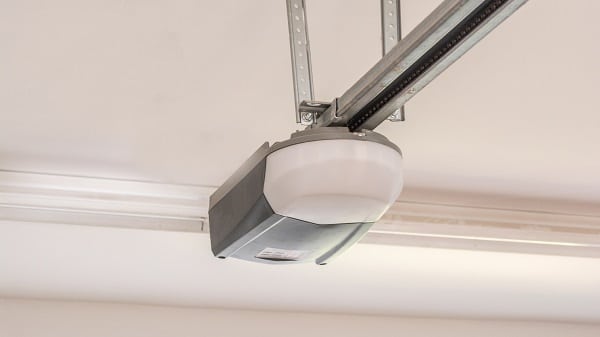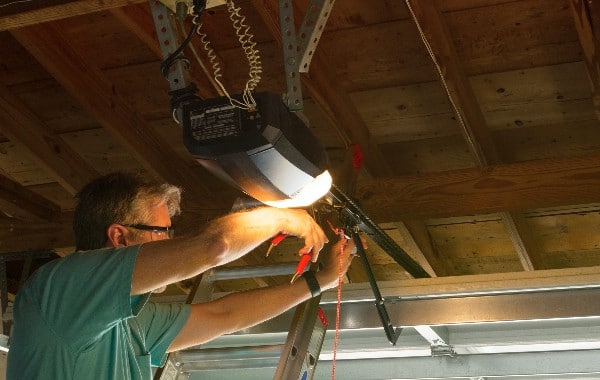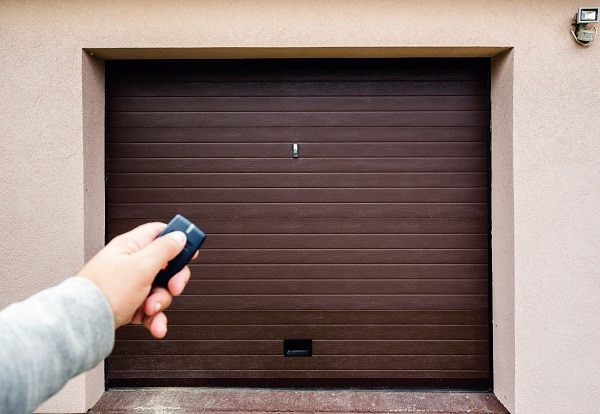If the sound made by opening your garage door makes your family wake up with a start, wondering if a thunderstorm has just started, then you need to take steps to quieten your garage door.
Even if you have completely soundproofed your garage your garage door can still cause problems as most garage doors are installed with very little thought for noise reduction. Thankfully there is a lot you can do to make them quieter.
Here are 9 tips that will transform your garage door from a giant noise machine into a smooth, silent hatch:
1. Insulate Your Garage Door
Garage door insulation is commonly done to keep heat in when the garage is being used more like a regular room such as a music room or a gym.
However insulating your garage door is one of the most important things you can do to help make it quieter.
Most garage doors are made from steel, aluminum or vinyl. None of these does a great job of deadening vibrations, in fact an uninsulated garage door can act like a big drum, significantly amplifying any vibration that travels through it.

Increasing the R-value (heat resistance) of your garage door by fitting insulation will quieten your door significantly when it opens and closes.
There are three types of insulation that are used for insulating garage doors:
- Foam Board Insulation – this comes in the form of panels which offer a lot of insulation without being particularly thick. This is the best type of insulation to use to insulate a garage door as it is not too bulky & does a great job of dampening sound.
- Batt Insulation – this type of insulation is commonly used in walls and ceilings, a popular brand of batt insulation is Rockwool. It is effective for garage door insulation however it can be quite bulky and it is prone to breaking up if not covered up.
- Reflective Insulation – the type that you often see draped around runners after completing a marathon. Not the most effective option for quietening your garage door as it is fairly thin so has limited dampening properties.
Take the foam board insulation and use polyurethane glue to stick it to the inside of your garage door, covering as much surface area as possible.
2. Tighten Nuts, Bolts & Screws
Over time garage doors can become very rattly, constant opening and closing can slowly cause nuts and bolts to loosen.
Have a good look over your garage door for any loose nuts, bolts or screws and ensure that they are thoroughly tightened up to prevent avoidable rattling sounds and help your door move more smoothly.
3. Lubricate The Door
It is a good idea to lubricate your garage door every year to minimize wear and tear, keep it running smoothly and minimize noise.
To lubricate your door buy a lithium-based oil, WD-40 isn’t designed for garage doors and normal oils drip more than purpose made garage door oil and are also more likely to collect build-ups of dirt and dust.
Once you have got your oil, apply it to each of the following areas:
- Hinges
- The garage door rollers (this sit inside the frame of your garage door)
- The bearing plates and springs (these sit above your garage door, the spring is usually in the middle with bearing plates at either end)
- The lock (spraying this will make it easier to open and prevent it rusting up in the future)
- The rails (the part that your garage door rides up into when it is fully open)
Having done all this your garage door will no operate a bit more smoothly and quietly. Doing these every year will help prolong the life of your garage door.
4. Use a Quiet Garage Door Opener
Automatic garage door openers make driving your car into your garage a much simpler job. However not all garage door openers are created equal, particularly when it comes to noise levels.

Chain driven garage door openers make far more noise than their belt-driven counterparts. Some older models also use AC powered engines which are noisier than more modern DC powered engines.
Switching your old noisy garage door opener for a purpose made quiet garage door opener will make a big difference to the overall quietness of your garage door.
5. Pair Your Garage Door Opener With A Garage Door Silencer
Whether you have a purpose-made quiet garage door opener or not your garage door opener will benefit from being fitted to a garage door silencer.
Even the quietest garage door openers create vibrations when in operation. Because they are bolted directly to the ceiling the vibrations travels straight into your ceiling joists and into the floor above, disturbing whoever is in there.

A garage door silencer work by decoupling your automatic garage door opener from your ceiling thereby significantly dampening vibrations and using up sound energy before it gets into the upstairs room.
They are relatively easy to fit (it just requires some drilling and bolting) however you will have to detach your door opening machine to fit one so if you are not comfortable doing this then consult a professional (get a quote here).
6. Replace The Rollers With Quieter Nylon Rollers
Your garage door rollers are one of the main culprits when it comes to noise, the sound they make rolling up the frame is often responsible for the bulk of your garage door’s noise.
An easy (and low cost) way of reducing this is to switch your wheel for nylon covered wheels, these are much quieter because they are softer so create far less noise.
Replacing your rollers will differ depending on how your door is built however for the majority of doors you simply need to remove the brackets which hold the rollers, pull the roller out and swap it over – check out this video for a walkthrough on how exactly to do it.
7. Replace Extension Springs With Torsion Springs
A word of warning if you are thinking of doing this yourself – garage door springs can be very dangerous so please be extremely careful when handling them. We do recommend you ask a professional to swap your springs for you, however if you wish to do it yourself here is what you need to do:
Remove The Existing Extension Springs:
- Open your garage door fully, this will take the tension out of the springs.
- Unplug your garage door opener and disconnect it from your garage door, the method for doing this will vary depending on your model of the door opener.
- Disconnect and take down the safety cable.
- Now the extension spring should be slack and loose and can be safely removed.
Install The Torsion Springs:
As previously mentioned this is a potentially dangerous and difficult job so if you’re not 100% confident then hire someone to do it, if you are keen on doing it then check out these detailed step by step instructions at naturalhandyman.com.
8. Replace Your Garage Door Bottom Seals
Garage door noise is often blamed on the opening mechanisms, be that the rollers, automatic door openers or just door rattling however the noise your garage door makes when it closes can be just as noisy, if not more so, than when it is being opened.

Implementing all of the steps above will make your door quieter to close however an additional step you can make to make it even more quiet is to replace your garage door seals with ones that fit well and have plenty of padding. This will prevent your door from slamming shut and making a ton of noise.
Check out our article on how to seal a garage door for information on how to fit a garage door bottom seal.
9. Replace Your Garage Door Side Seals
Garage door side seals are often forgotten but they are just as important as bottom seals, replacing these can also help make your door close more softly and avoid a slamming noise.
About Quieting Garage Doors
We hope these tips have proven to be useful to you in your quest to quieten your garage door.
A noisy garage door can be a big problem in homes where people sleep above the garage and someone has to leave in the early hours, hopefully these tips will help you silence your garage door and make whoever sleeps upstairs much happier!
As an Amazon Associate I may earn a small fee from qualifying purchases at no extra cost to you. This helps us run the site, so thanks for your support!